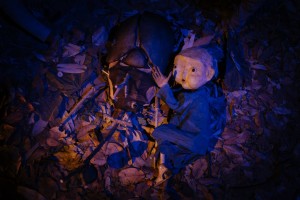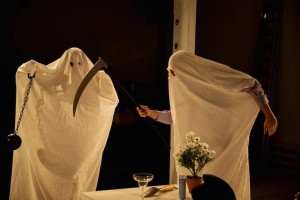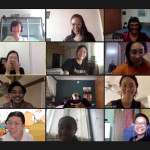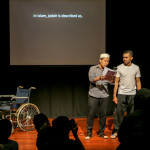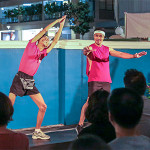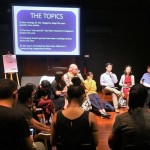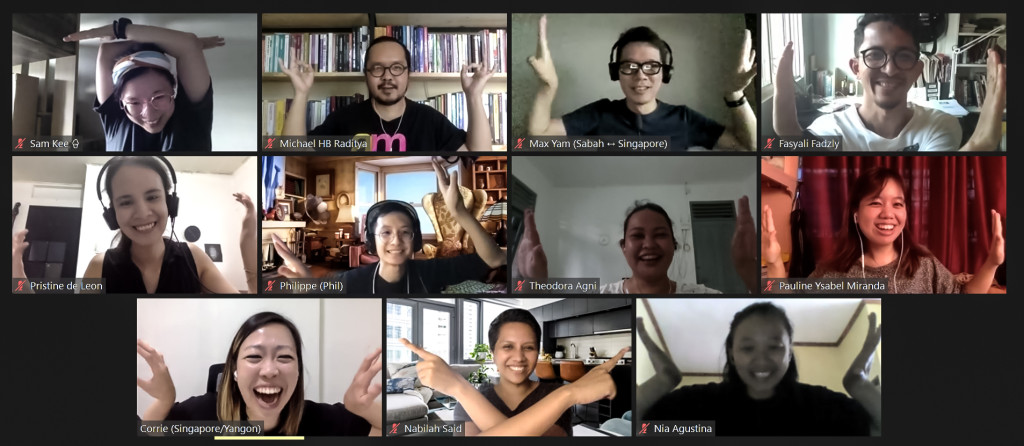
The transnational working team for Critical Ecologies | Critical Anomalies “connecting” through the screen.
In this Q&A segment, the team got to ask (and answer) a set of 2 questions from their fellow members. The first round of questions were more casual, with the follow up questions a bit more specific and conceptual.
Sam: How do you maintain a sense of lightness in your writing/review?
Nia: As long as I remember, I rarely wrote heavy writing or reviews. It’s just simply because I don’t have enough knowledge to do that… hahahaha. My discursive vocabulary is also really basic, still working on that! So, writing in the sense of lightness mostly because of my limits. So far, this is also great in the sense of bridging and dialogue with the public and artists. But of course, not enough for more discursive platforms and academics.
Sam: How do you balance the amount of academic “evidence” to substantiate what you’d like to argue for or against later in the review?
Nia: The second question is the tough one. I don’t really think about the balance actually, but mostly just put the academic evidence whenever needed. But mostly when I write I always imagine myself talking to those artists. Sometimes it gets me surprised that one review has a lot of academic references because this artist sometimes talks to me in person with a strong academic base and the other one without any, because when we meet, we always talk in a reflective way. That’s why I prefer to write about artists that I know in person, it’s fun to imagine that while writing.
Nia: What’s your favorite side food/snack for coffee, and why?
Pau: Chocolate chip cookies or cake (any kind!) are the best, for me. When it’s available, I also like pairing my coffee with a Philippine delicacy called piaya (unleavened flatbread filled with muscovado).
Nia: What scares you the most when working in the art scene, and why?
Pau: One thing I worry about a lot when it comes to working in/with the art scene is if my understanding of a work and its context is enough. I’m scared I might end up oversimplifying their intention or their work’s theme in an attempt to make the art more approachable for my readers.
Pau: How many times do you watch a show/performance before you critique it? Are you a “once is enough” type or do you watch multiple times?
Michael: I never believed in love at first sight, but performing arts proved me wrong. I can be in love because of watching a performance with or without reason. And I believe the magical things that make me think about the power of performance. So I do not need to watch a performance twice or more before I review it, or I can say that I am a type of “once is enough” for watching a performance. Oh, I know other reasons why I am the type of “once is enough” for watching a performance, hehe, because I always bring my journal. So I will write every interesting or important thing in the performance hehe. The journal helps me to remember, interpret, and analyse the performance.
Pau: Have you ever felt like you’ve overanalyzed a show/work? Or do you believe there’s such a thing as overanalysis of art?
Michael: Yes, I have experience of overanalysing a show. It happened when I worked as a freelancer at a local newspaper 8 years ago. There was a local performance from East Java that performed the traditional form of their dances. So simple, and their intention not for contemporary dance or reveal the representation, but only presentation. And I did overanalyse that performance with the neglected discourse. After that, I realised not every performance we should review. Sometimes we just need to watch, relax, and enjoy it.
Michael: After watching the show, are you the type of critic/researcher/writer who goes home immediately or finds friends to talk about the show before you criticised the show?
Nabilah: I don’t have a preference for one or another, but I think it depends on my state of mind after watching the show. Sometimes it affects me quite profoundly, and I feel the need to go home immediately but maybe also take a walk to try to process how I feel. Sometimes I find that I want to preserve my thoughts about the play, without checking in with others and “tainting” my own perspective. I think this usually happens when I have to review more mainstream shows – I am quite impressionable, so I want to avoid changing my mind too easily. For other shows, especially those I don’t need to review, discussions with friends tend to be very crucial and is part of the entire watching experience.
Michael: Have you ever made a typo in your critique? What’s the unique experience?
Nabilah: Haha, I think so but I usually catch myself before it goes out! I tend to obsess, overthink and re-read my reviews to prevent this from happening.
Nabilah: What’s the most difficult review you have had to write?
Jali: Hi Nabilah. Hmmm difficult questions… I’ll answer in Bahasa Indonesia… Saya sebenarnya tidak banyak menulis, hanya pernah mencoba beberapa kali. Hal tersulit adalah mengulas karya saya sendiri…  Jika mengenai karya orang lain, saya merasa “sense” terhadap seni visual saya buruk dan basis pengalaman karya saya adalah teater drama (teater dengan teks/dialog). Maka saya merasa sulit ketika mencoba mengulas sebuah pertunjukan tari atau teater tubuh yang tanpa dialog.
Jika mengenai karya orang lain, saya merasa “sense” terhadap seni visual saya buruk dan basis pengalaman karya saya adalah teater drama (teater dengan teks/dialog). Maka saya merasa sulit ketika mencoba mengulas sebuah pertunjukan tari atau teater tubuh yang tanpa dialog.
[Translation: Hi Nabilah. Hmmm, difficult questions… I’ll answer in Bahasa Indonesia… I actually don’t write very much, and I’ve only ever tried it a few times. I think the hardest thing is reviewing my own work…  When it comes to other people’s work, I feel that my “sense” towards visual arts is pretty bad, and the basis of my work experience is the theater (particularly theatre with text/dialogue). So I find it really difficult when trying to review dance performances or physical theatre that doesn’t have dialogue.]
When it comes to other people’s work, I feel that my “sense” towards visual arts is pretty bad, and the basis of my work experience is the theater (particularly theatre with text/dialogue). So I find it really difficult when trying to review dance performances or physical theatre that doesn’t have dialogue.]
Nabilah: Do you think there’s such a thing as “bad” art? Why or why not?
Jali: Bagi saya, seni adalah cabang aktivitas ekspresi manusia, sama seperti sastra, musik, teknologi dan lainnya. Jadi tentu ada seni yang “buruk” menurut saya. Tetapi seringkali saya tidak berani mengungkapkan itu di depan publik, sebab saya sadar bisa jadi itu hanya pengaruh subyektifitas saya saja.
[Translation: To me, art is a branch of the activity of human expression – just like literature, music, technology, etc. So there is definitely “bad” art, in my opinion. But often I don’t dare to reveal this in public, because I realise that it might just be the influence of my subjectivity.]
Jali: Do you still remember your very first review? When and what performance did you review?
Corrie: My very first review for The Straits Times in Singapore was back in 2006, so 15 years ago. Wow. The performance was a collaboration between Deaf performers Ramesh Meyyappan (Singapore) and Lars Otterstedt (Sweden) called The Art of War, where they took on stereotypes around masculinity and the performativity of social norms and rituals gendered as “male”. I only remember fragments of the show now, but what remains with me is the precision and dynamism of their mime and performance work.
Jali: Have you watched many Indonesian performances? What is your favorite Indonesian performance until today?
Corrie: Interestingly enough, my encounters with Indonesian performance have skewed more towards dance and film. Most recently, I watched The Planet – A Lament directed by Garin Nugroho, as well as Otniel Tasman’s lengger work Nyawiji, which was part of this year’s ARTJOG. I watched both these works online, but it would have been extraordinary to witness them in person (I was sweating, watching Otniel with the blade of a keris in his mouth…).
The work that left one of the deepest impressions on me during these pandemic times was a children’s theatre production: A Bucket of Beetles by Papermoon Puppet Theater. This was a digital experience, but it felt so tactile and immediate, like we were all crawling through the dense leaf litter of a tropical forest, befriending the tiny, more-than-human creatures that surround us. There was also a strong undercurrent of ecocriticism in this nonverbal performance, particularly when it comes to our negligence of the ecosystem we share with others. Sadly, I haven’t encountered as much live performance in Indonesia due to the current restrictions on travel, so I’ve been making do by reading about Indonesian performance history, e.g. work by Arena Teater, Teater Koma, Teater Payung Hitam, etc. But of course it isn’t the same!
The last few times I was in Yogyakarta, in 2018/2019, I was lucky to witness some experimental works in progress by artists and practitioners from Bandung, Bali and Yogya as part of the Asian Dramaturgs’ Network’s Lab. We all gathered at Teater Garasi and had long conversations about the pieces after.
Corrie: What piece of art or work of performance has moved you the most during these coronavirus times, and why?
Pristine: Thanks Corrie! I watched a play called Titser Kit directed by Adrienne Vergara for Virgin Labfest 2020. The festival was full of experimentation and making do, and I was interested in how the works would respond to limitations (tight budgets, rehearsing remotely) and deal with a medium that was back then still very daunting. Titser Kit was about a teacher encouraging a young Lumad student to come out from hiding under a table. I was struck by its simplicity. In black and white, the characters’ crouched bodies and faces were shown through alternating screens (like the screens on Zoom) and I thought the setup conveyed the anxious confinement and uplifting intimacy that we often felt. The theme spoke to systemic injustice and the realities of othered bodies, and there was so much tenderness to it. What comes to mind now are the warm smiling eyes of the teacher character. It reminds me how loss is all the more poignant when we have a sense of what was full.
Corrie: What’s something new you’ve learnt or come to cherish from this residency period that you’re hoping to share with your students and community of practice in Manila?
Pristine: Definitely conversational criticism! Before this residency, I’ve been thinking through the very limiting binary of ‘difficult writing’ versus ‘accessible writing’ (which in my head somehow corresponds to academia versus media). Throughout our sessions, I’ve come to realize that this debate may have had its roots in the West, but here in Southeast Asia, there are other nuances, wide gray areas, that need to be considered. For one, translation. It makes passing on knowledge more challenging—as Nia, Jali, and Michael have consistently pointed out. These might be the questions that Euro-American critics take for granted. Instead of choosing just one side, I think the idea of conversational criticism invites us to be more nimble with language. Conversations are always fluid and never finished; they embody that exciting, nervous negotiation. I imagine conversational criticism as an amazingly playful tug-of-war between distinct voices. Or a site where multiple positions, affects, registers, and languages come together. I’m excited to ask my students how conversational criticism can be expressed either through oral practice or performative writing. They can record their conversation, interview each other (like what we’re doing here!), write letters, or co-write essays.
Pristine: Fasyali, when you need to review a performance, how do you remember the tiny details? Are you the type who writes notes during or right after a performance? Or do you allow yourself to enjoy watching without distraction and simply rely on memory when you write?
Fasyali: I usually don’t take notes during performance. I will try to enjoy it like a normal audience but of course paying so much attention to every detail. I tried taking notes during the performance, but ended up not enjoying it much because I didn’t see the bigger picture and its context.
Pristine: Throughout the residency, we’ve talked about criticism as a long-term commitment or a durational practice. But if critics change over time, how do they express that they have changed their mind? To be more concrete: Have you ever written an opinion or evaluation that you no longer agree with now (or maybe a review that you think needs to be updated)? Do you feel a need to address these past opinions in future writing? Or do you just move on and let them be, seeing that they have value as they are?
Fasyali: Principally, as a critic, we must acknowledge that we are also human beings that can change over time. I did write something that I don’t agree with anymore. Of course I will find a way to update that but not in that writing. I will find a way to update my view/opinion in different writing and acknowledge it to my reader. My view or stand might change because of my exposure to current situations, knowledge and other discoveries. My past writings are not just part of the history of that particular performance, but also become part of my history as well. So, I will try not to update that but embrace it. I will not be ashamed of who I was.
Fasyali: How many languages/dialects do you usually use in everyday life? How comfortable are you using the language(s)?
Max: I use primarily English and Mandarin in life. I have some Malay colleagues at my workplace so sometimes I use a little bit of Malay in casual conversations. When I encounter people who could speak Cantonese (my mother tongue) and/or Hakka, I might start conversations with these languages, or switch to them during conversations. English is a language for work, I face a little bit of difficulty using it for casual chats – I would speak very slowly. For arts and theatre-related topics, I have the widest vocabulary in Mandarin.
Fasyali: In writing, how do you see the language that you use in your review can reach different audiences from different backgrounds? Have you ever had any doubt that the words, sentences and language that you use are too simplistic or complicated for you reader?
Max: Yes I think one of the biggest problems (if not the biggest) of mine in review writing is my language. I find it hard to speak my mind freely. I used to keep a blog (before Facebook came out), and I could use my way of speaking in daily life (with wrong sentence structure etc) in my writing. I had much confidence in writing this way as my friends told me the blog really reflected my personality and they could understand my train of thought perfectly, and most importantly, they enjoyed reading it. However when I started writing theatre reviews, I felt I could not write like that anymore. I felt it’s a more ‘serious’ thing, and all the materials I read about theatre and criticism do not look or sound like that. I thought, in order to make my reviews more ‘legit’, I need to learn from or be inspired by them. But I get feedback like “I don’t really know what you’re saying.” I’m not sure if I’m following the good examples, or it’s because I have not improved enough.
I think the words I use are definitely simple (as I have no academic background), but it’s the organisation of words, sentences and arguments that is complicated for readers.
Perhaps this is one of the reasons why I switch to asking questions and begin thinking about conversational criticism.
Max: Could you share with us three shows or experiences that shaped and/or reshaped your understanding of theatre or performing arts? They could just be three shows that are stuck in your brain now.
Sam: Afternoon of a Foehn Version 1 (Esplanade Annex, 2017) was curated for a younger audience but its light-heartedness and fun elements (think clowning, balloons, non-verbal language, and a little physics) made the theatrics accessible and thought-provoking at the same time. I love it. It’s staying at the top of my list, always.
1 Table 2 Chairs (The Theatre Practice’s Chinese Theatre Festival, 2013) was my first encounter with (what I thought to be an) alternative theatre form, the power of symbols and what a minimalistic stage could do.
Ibsen: Ghosts, by Markus & Markus (Singapore International Festival of Arts, 2016) showed me the power or impact of docu-verbatim theatre and made me rethink about their content topic “death” and the authority one has over oneself.
Max: If you could ignore everything you have learned about writing good reviews (e.g. context), how would you write a review? What would it look like?
Sam: I wish I could just submit my handwritten sketches, mindmaps, journaling notes/word clouds and thoughts about the show that aren’t constructed in proper full sentences.
By Critical Ecologies | Critical Anomalies
September 2021

